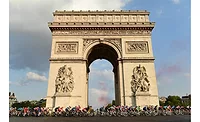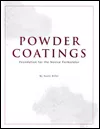A Powder Coating Tour de France
Last fall, Industrial Paint & Powder traveled to Europe with the DuPont Star Coaters to visit custom coaters in France, Belgium and England. In December, we ran a story on Société Fougeraise de Peinture Industrielle, a finisher in Fougeres, France, which was our first stop on the tour. This story focuses on our second stop in France.
Evron Pienture Industrielle, a job shop coater in Evron, France, handles a wide variety of products, substrates and powder chemistries. EPI is a family-owned business with 80 employees and two production facilities totaling more than 86,000 square feet. The family started its business in 1986 with six people.
It services the appliance markets, general industry and automotive, applying powder to metal and plastic. According to François LeBoube, the owner of EPI, the business has targeted a niche of "very difficult projects" and avoids competing for more common work that most job shops can handle.
EPI can run small parts or very large parts, some of which cannot be coated anywhere else in France. It provides a 10-year guarantee on large, architectural aluminum and steel parts. EPI uses its own delivery trucks, and standard turnaround time is no more than two days. In all, it has four distinct production lines coating different types of products and using different processes.
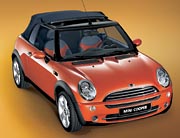
Line one
Line one is dedicated to automotive work for Peugot, Saab, PSA and others. One job for which EPI is the exclusive vendor is the Mini Cooper window frame. It receives the parts, pretreats them in a multistage spray washer and then applies an adhesive that is used for installation, shipping 15,000 pieces per day. The line also applies powder to many other automotive parts and specializes in very difficult masking projects.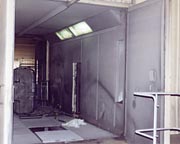
Line two
In 1999, EPI installed a batch system to handle very large steel and galvanized parts. These parts are chemically cleaned with a high-pressure wand or mechanically cleaned with a light grit blast. A zinc-rich powder primer is applied, followed by a second coat with a polyester powder topcoat. As is the case throughout the European Union, the polyesters are non-TGIC materials based on Primid resin systems. A large convection batch oven is used for curing. The system is capable of processing a part that is 10 feet by 10 feet by 20 feet. Gates, fencing and other large welded parts that are used in outdoor installations are the majority of the products coated on line two.
The parts are moved through the processes on a manual-push conveyor system. Using an overhead rail allows them to run dense loads with a minimum of manual handling when moving parts through the stages of the coating process. The manual sprayer can take whatever time is needed to complete a load because the parts are stationary. This allows the system to run a large volume of bulky parts with relatively low labor costs.
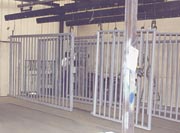
Line three
The third line is a monorail system designed for flexibly processing various steel and aluminum products. The spray washer is designed so that parts can be processed in three or five stages, depending on the type of substrate and what the performance requirements are for the product. Powder is applied manually, automatically or both, depending on the size and shape of the part and the length of the run.
The cure oven uses an infrared booster stage to start the melt phase of the cure and a convection stage to finish the cure. A typical product on line three is an aluminum heater cover that includes the front, back and chassis. They run 5,000 covers a week (15,000 pieces) on one radiator alone. The line also processes a large number of aluminum chairs and many other products for general industry.
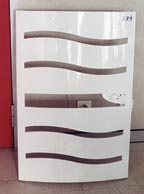
Line four
A little more than one year ago, EPI installed its newest and most interesting line. It is an advanced technology that processes thermoset, reinforced plastic compounds, including sheet molding compound (SMC) and bulk molding compound (BMC). The combination of the thermoset resin and fiberglass reinforcement produces a lightweight, durable product that can withstand the temperatures necessary for powder cure.Parts that will be coated with the special powders used for this process are first pretreated in a multistage spray washer. The first stage of the washer applies a proprietary material that makes the surface conductive to facilitate electrostatic application.
Parts are then preheated in a convection oven to eliminate outgassing and enhance powder application. Preheat temperatures vary from 320 to 356°F. Some of the plastic materials are capable of going to 428°F.
After the plastic is preheated, it passes through an accelerated transfer zone to hold temperature into the powder booth. Powder is applied automatically, and the part is moved to a convection oven for curing.
The line is capable of running metal, SMC, BMC and Envex. Envex is a DuPont product that incorporates a specific plastic material with a compatible powder to produce an exceptional finish on a lightweight plastic substrate.
The quality of the finish is exceptionally smooth and hard, like a UV-cured finish or high-priced, premium polyurethane. EPI uses the Envex material for fire hydrant covers, supplying 80% of the covers for that market worldwide. Another big user is a manufacturer of radiator covers.
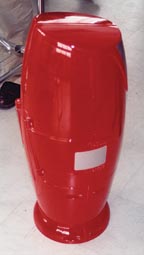
Coating removal from fixtures and parts
Just like any other finisher, EPI needs to remove powder from hangers and parts. The parts or racks to be stripped can be of steel, iron, bronze or aluminum. EPI chose a fluidized sand strip tank.The parts are loaded into a basket that is hoisted into the tank where the fluidized hot sand scrubs and burns off the organic material and vaporizes it without damaging or warping the work pieces. The cleaning cycle takes from 20 to 40 minutes at a temperature of 800 to 850°F. The time cycle is related to the mass of the load and the amount of organic coating material to be removed. The basket of cleaned parts is lifted out of the fluidized bed tank with a hoist and allowed to cool.
In most cases, the parts or racks do not require any post rinsing. The friction from the hot sand rubbing against the metal surface removes most of the ash left over as the organic coating is broken down.
The fluidized sand-tank system utilizes a special blower to fluidize the calibrated quartz sand inside the tank. The fluidizing air is premixed with the combustion gas and is burned on the surface of the sand bath. The combustion gas supply modulates to satisfy the temperature requirements based on the amount of energy generated by the burning of the organic materials.
The organic coatings are burned and consumed within the sand bed. The vaporized gases given off by the process are incinerated as they pass through the post-combustion afterburner flames on the surface of the sand.
According to LeBoube, the fast cycle times and completely clean surface is extremely valuable because EPI can meet fast turnaround times and minimize the labor, handling and other costs associated with coating removal. The initial equipment cost was high, but it was recovered very quickly in reduced processing costs.
EPI has hit on a winning approach to the job shop coating business. It stresses flexibility and exceptional quality, and provides services that few others are capable of providing. With its commitment to fast delivery and unique products, EPI will probably continue to grow and add to its family of products.
Looking for a reprint of this article?
From high-res PDFs to custom plaques, order your copy today!




